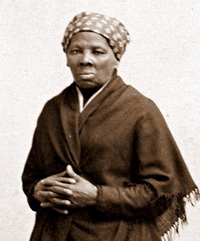
March 10, 2018:
March 10 marks the 105th anniversary of the death of a giant in American history, albeit a giant who stood less than five feet tall. Born sometime between 1819 and 1823, Harriet Tubman spent her childhood as a field slave in Maryland, living a harsh existence that included frequent and brutal beatings. When she was a teenager Harriet was hit in the head by a two-pound iron weight that had been thrown at another slave by a plantation manager. The injury left her with a severe narcoleptic disorder while also giving her visions and dreams that she considered signs from God.
In 1849 Harriet and her two brothers escaped but her siblings panicked and returned to the plantation. Harriet found refuge in Pennsylvania where she became a conductor in The Underground Railroad, a network established by abolitionists and free African Americans to guide slaves to freedom. In 1850, Harriet returned to Maryland and successfully led several of her relatives to freedom. It was just the beginning of a legendary career.
Tubman’s nineteen trips as a conductor during the 1850s resulted in over 300 slaves attaining freedom. None of her passengers were ever caught, partly because Tubman threatened to shoot any slaves who tried to go back. Saying “you’ll be free or die”, Tubman knew that returning slaves could be coerced into giving up valuable information and she realized the necessity of protecting the secrets of the railroad and the identities of its supporters. Because of her extraordinary success, renowned abolitionist William Lloyd Garrison nicknamed her “Moses”. The Confederate army labeled her the “black ghost,” and placed a $12,000 bounty on her head (over $300,000 in today’s dollars).
Just your normal nurse, field general and spy
Harriet Tubman became a master of disguise and deception while becoming an expert at scouting escape routes. She made up for her inability to read or write with her singular ability to keep track of copious amounts of information.
She was of immense help to John Brown in the planning of his 1859 raid on Harper’s Ferry, West Virginia. She advised Brown on the topology of the area and elicited support from fugitive slaves in the region. Brown dubbed her “General Tubman” and fully expected her help in the raid however illness prevented Tubman from participating.
During the Civil War, Tubman worked as a nurse for the Union army. Her knowledge of local plants helped cure soldiers of dysentery and relieve symptoms of Chicken Pox, Cholera, and Yellow Fever.
In June 1863, Tubman was selected to help lead a raid against confederate troops at Combahee Ferry, South Carolina. Tubman is credited with gathering crucial intelligence on the location of Confederate mines in the Combahee River. The three Union gun boats carrying 300 black troops made it safely past the submerged mines and freed 700 slaves, 100 of whom would enlist in the Union army.
Despite her exemplary service, it took 34 years for Tubman to be awarded veteran’s benefits and only after the intervention of William Seward, former Secretary of State and Governor of New York. She developed a friendship with Seward who gave her $1200 to purchase a house in his hometown of Auburn, New York. Seward said “I have known her long, and a nobler spirit seldom dwells in a human form”
In her later years, Tubman traveled across the country to speak on behalf of women’s voting rights. Meanwhile she continued to suffer the effects of her childhood head injury. She underwent brain surgery at Boston’s Massachusetts General Hospital in the 1890s. Even though Mass. General was the first hospital to utilize anesthesia, Tubman chose the soldier’s method of chewing a bullet during her surgery.
Tubman’s accomplishments eventually received international acclaim. In 1897, Queen Victoria awarded Tubman a silver medal, a cash stipend and a shawl that Tubman proudly wore until her death in 1913. She was buried in Auburn’s Fort Hill Cemetery with military honors.
Harriet Tubman inspired millions and probably had great influence on the man who would deliver his “I Have a Dream” speech in Washington, almost fifty years to the day after Tubman’s passing. After all, it was Ms.Tubman who once said “Every great dream begins with a dreamer. Always remember, you have within you the strength, the patience, and the passion to reach for the stars to change the world.”
Have a great weekend.
If you are looking for top-notch marketing support contact ted@blackdotmessaging.com

